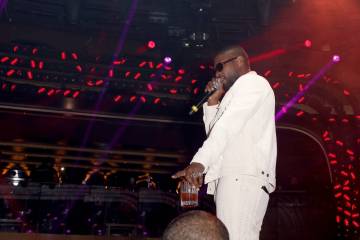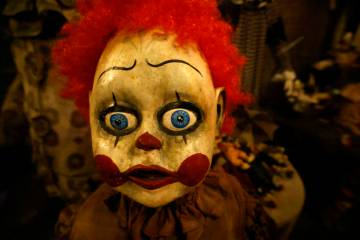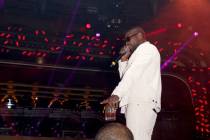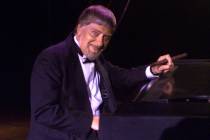Henderson Symphony revives long-lost 1922 epic with original score
The sound of silents.
Since 2011, it’s been an annual tradition at the Henderson Pavilion, with the Henderson Symphony providing live orchestral accompaniment for a silent movie.
But this year’s attraction, “The Loves of Pharaoh,” isn’t just any silent movie.
The cast-of-thousands German epic, released in 1922, was lost for almost a century — and had to be reassembled, like a jigsaw puzzle, from footage found in various countries, from Germany and Russia to the U.S. (via Italy).
Moreover, “Loves of Pharaoh” is one of the few silents that boasts its own original score, composed for full orchestra and written to accompany its original release.
The movie’s director, Ernst Lubitsch — whose later Hollywood output includes such classics as “Ninotchka,” “The Shop Around the Corner” and “To Be or Not to Be” — commissioned opera composer Eduard Kunneke to score the epic.
“The music is gorgeous,” says Alexandra Arrieche, HSO’s conductor and artistic director. “The tunes are very beautiful” and could “stand without the movie.”
Without the movie, however, there would be no music.
“To conduct an orchestra is a very hard task” under any circumstance, says Arrieche, who auditioned for her current post by conducting Fritz Lang’s futuristic 1927 silent “Metropolis” last year. (Former HSO music director Taras Krysa conducted the first five silent screenings, all Charlie Chaplin comedies.)
Unlike contemporary movie scoring, where musicians and conductor have click tracks that provide “the correct tempo, the correct timing” to coordinate sight and sound, the Henderson orchestra is using “a very old style, as if it was at that time,” with Arrieche “doing it by sight and by ear.”
At a recent rehearsal — in the Greenspun Junior High band room — Arrieche leads the orchestra through one of Kunneke’s rousing musical passages.
The orchestra members watch as she signals to various sections. But as she conducts, she’s watching the screen of her laptop computer to make sure the music matches the action, as seen in the 2011 “Loves of Pharaoh” restoration.
“I know the movie — every single movement,” the conductor explains. “The way an actor looks at an actress, that means ‘call the oboe.’ I need to be really connected to what’s happening and think ahead.” Because “the orchestra will react to your reaction, your head has to anticipate.”
And while “it’s a huge, huge challenge,” Arrieche says, it’s also “really fun.”
That’s been the goal since the silent screening series debuted in 2011, notes Nicole Johnson, public relations coordinator for the city of Henderson, which collaborates with HSO on the annual program.
“It’s been a fan favorite for a number of years,” Johnson says of the series, which began when Krysa — who had led live orchestral accompaniment for silent movies elsewhere — suggested it for the Henderson Pavilion.
The silent movie-with-music package represents something “not a whole lot of people have had the chance to experience,” Johnson comments, noting that it helps “bring back the old-school theater experience from a hundred years ago.” (Or, more precisely, 95 years.)
Arrieche attests to “Loves of Pharaoh’s” larger-than-life impact.
“It’s huge,” she says of the movie. “I’ve never seen a production that big,” likening it to such later Hollywood epics as “Ben- Hur,” “Spartacus” and “Quo Vadis.”
Although “Loves of Pharaoh” was made in Germany, by a German director, with German stars — notably title-role star Emil Jannings, who won the very first best actor Academy Award in 1929 — Hollywood’s Paramount Pictures included it in publicity for the studio’s 1922 lineup.
A newspaper advertisement touted “the greatest shows of the greatest season in the history of entertainment,” noting that the studio had “gathered all the great geniuses of production … to produce the most magnificent thrilling pictures!”
Come Friday, Southern Nevadans in 2017 will have the chance to experience what 1922 audiences saw when “The Loves of Pharaoh” first arrived on the silver screen.
The Lubitsch Touch: the filmmaker behind ‘The Loves of Pharaoh’
In his day, director Ernst Lubitsch was as famous as his movies, a household name on the order of Steven Spielberg or Alfred Hitchcock.
Many of his movies — including Ninotchka,” “The Shop Around the Corner” and “To Be or Not to Be” — remain all-time classics. But Lubitsch’s own star has faded, although you can still find his name, and his star, on Hollywood Boulevard’s Walk of Fame.
Lubitsch’s 1922 epic “The Loves of Pharaoh” — screening Friday night at the Henderson Pavilion, with the Henderson Symphony Orchestra performing the movie’s original score — was made in Germany, where the Berlin-born Lubitsch got his showbiz start as an actor before turning to filmmaking.
But “Loves of Pharaoh,” the cast-of-thousands tale of an Egyptian king who falls in love with a Greek slave girl, was financed — and influenced — by Hollywood.
It also proved Lubitsch’s ticket to Hollywood; the same year it was released, screen queen Mary Pickford invited him to come to Hollywood to direct her in 1923’s “Rosita.”
It took a few more movies for Lubitsch to establish himself as a top Hollywood director — and the arrival of sound to fully establish “The Lubitsch Touch” as a unique, sometimes indescribable but utterly unmistakable cinematic attraction.
After demonstrating his expertise in such spectacles as “The Loves of Pharaoh,” Lubitsch proved his mastery of musicals (“The Love Parade,” “Monte Carlo”) before making his ultimate mark in comedy.
Sophisticated yet down-to-earth — sometimes even earthy — Lubitsch proved an amused, rueful observer of human foibles, spinning gossamer comedies that explore profound truths in lighter-than-air fashion.
As he once said, “I’ve been to Paris, France, and I’ve been to Paris, Paramount. Paris, Paramount is better.”
He knew that from experience, eventually becoming Paramount’s production chief in addition to directing and producing his own movies.
Not long before he died in 1947 (from a heart attack, at 55), Lubitsch received an honorary Academy Award for “his 25-year contribution to motion pictures.”
But perhaps two fellow directors — and two fellow fugitives from Europe — best expressed what Lubitsch meant (and still means) to the movies.
Leaving Lubitsch’s funeral, Billy Wilder (who scripted “Ninotchka” and would eventually go on to direct his own classics, from “Double Indemnity” and “Sunset Boulevard” to “The Apartment”) ruefully said, “No more Lubitsch.” William Wyler (whose credits range from “Ben-Hur” to “The Best Years of Our Lives”) responded, “Worse than that. No more Lubitsch pictures.”
But at least we still have the pictures Lubitsch did make. Including “The Loves of Pharaoh.”
Contact Carol Cling at ccling@reviewjournal.com or 702-383-0272. Follow @CarolSCling on Twitter.


































